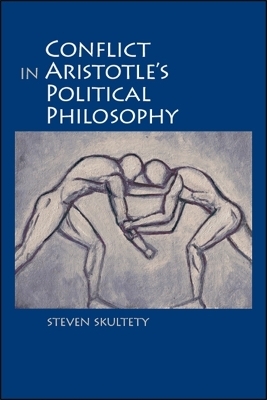
Conflict in Aristotle's Political Philosophy
Seiten
2019
State University of New York Press (Verlag)
978-1-4384-7657-5 (ISBN)
State University of New York Press (Verlag)
978-1-4384-7657-5 (ISBN)
Offers a careful analysis of how Aristotle understands civil war, partisanship, distrust in government, disagreement, and competition, and explores ways in which these views are relevant to contemporary political theory.
Do only modern thinkers like Machiavelli and Hobbes accept that conflict plays a significant role in the origin and maintenance of political community? In this book, Steven Skultety argues that Aristotle not only took conflict to be an inevitable aspect of political life, but further recognized ways in which conflict promotes the common good. While many scholars treat Aristotelian conflict as an absence of substantive communal ideals, Skultety argues that Aristotle articulated a view of politics that theorizes profoundly different kinds of conflict. Aristotle comprehended the subtle factors that can lead otherwise peaceful citizens to contemplate outright civil war, grasped the unique conditions that create hopelessly implacable partisans, and systematized tactics rulers could use to control regrettable, but still manageable, levels of civic distrust. Moreover, Aristotle conceived of debate, enduring disagreement, social rivalries, and competitions for leadership as an indispensable part of how human beings live well together in successful political life. By exploring the ways in which citizens can be at odds with one another, Conflict in Aristotle's Political Philosophy presents a dimension of ancient Greek thought that is startlingly relevant to contemporary concerns about social divisions, constitutional crises, and the range of acceptable conflict in healthy democracies.
Do only modern thinkers like Machiavelli and Hobbes accept that conflict plays a significant role in the origin and maintenance of political community? In this book, Steven Skultety argues that Aristotle not only took conflict to be an inevitable aspect of political life, but further recognized ways in which conflict promotes the common good. While many scholars treat Aristotelian conflict as an absence of substantive communal ideals, Skultety argues that Aristotle articulated a view of politics that theorizes profoundly different kinds of conflict. Aristotle comprehended the subtle factors that can lead otherwise peaceful citizens to contemplate outright civil war, grasped the unique conditions that create hopelessly implacable partisans, and systematized tactics rulers could use to control regrettable, but still manageable, levels of civic distrust. Moreover, Aristotle conceived of debate, enduring disagreement, social rivalries, and competitions for leadership as an indispensable part of how human beings live well together in successful political life. By exploring the ways in which citizens can be at odds with one another, Conflict in Aristotle's Political Philosophy presents a dimension of ancient Greek thought that is startlingly relevant to contemporary concerns about social divisions, constitutional crises, and the range of acceptable conflict in healthy democracies.
Steven Skultety is Associate Professor of Philosophy at the University of Mississippi.
Acknowledgments
Introduction
Part I. Conflict in Imperfect Cities
Prelude
1. Stasis as Civil War
2. The Unique Problem of Partisanship
3. Managing Mistrust in Average Cities
Part II. Conflict among Perfect Citizens
Prelude
4. Dispute and Disagreement
5. Contending for Civic Flourishing
Part III. Aristotelian Conflict and Modern Political Thought
Prelude
6. Conflict and Constitutionalism
7. Conflict and Democratic Theory
Conclusion
Notes
Bibliography
Index Locorum
General Index
| Erscheinungsdatum | 11.10.2019 |
|---|---|
| Reihe/Serie | SUNY series in Ancient Greek Philosophy |
| Zusatzinfo | Total Illustrations: 0 |
| Verlagsort | Albany, NY |
| Sprache | englisch |
| Maße | 152 x 229 mm |
| Gewicht | 227 g |
| Themenwelt | Geisteswissenschaften ► Philosophie ► Ethik |
| Geisteswissenschaften ► Philosophie ► Philosophie Altertum / Antike | |
| ISBN-10 | 1-4384-7657-4 / 1438476574 |
| ISBN-13 | 978-1-4384-7657-5 / 9781438476575 |
| Zustand | Neuware |
| Haben Sie eine Frage zum Produkt? |
Mehr entdecken
aus dem Bereich
aus dem Bereich
unsere kollektive Verantwortung
Buch | Hardcover (2023)
wbg Theiss in Wissenschaftliche Buchgesellschaft (WBG) (Verlag)
CHF 46,90


